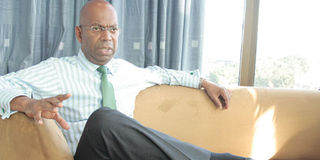Bob Collymore’s business lessons and his legacy

Mr Bob Collymore responds to a question at an interview. Photo/WILLIAM OERI
What you need to know:
- Under his stewardship, Safaricom has demonstrated that profits and purpose are not mutually exclusive.
- In fact, he believed that the company was, and remains, successful because it found its purpose. He recognised that, alongside delivering shareholder value and taking care of its people, business had to have a soul.
On December 8, 2015, Bob Collymore took a bold and unprecedented step for corporate Kenya. He made a public declaration on what he owned and had earned that year. As the chief executive officer of Safaricom, a private sector company, he did not have to; neither would he have broken any law by not making his wealth public. Yet he did — voluntarily.
This was borne out of Bob’s integrity and commitment to the fight against corruption. This decision, which inspired me to follow suit, demonstrated his belief that the anti-corruption crusade is for all.
For him, wealth declaration was not a preserve for public servants as required by law, but for everyone, for purposes of transparency and accountability. It was in the interest of the private sector, he constantly argued, that corruption was vanquished because it distorted the market and had a negative impact on society.
Today marks exactly one year after Bob’s demise. It’s a good time to reflect on his legacy, leadership and lessons for the private sector and the world.
A staunch believer in ethical, sustainable and purpose-driven business, Bob is a great inspiration for the world today, just as he was when he lived.
Lessons from his life are particularly relevant for business in a world beset by the effects of the Covid-19 pandemic. The business community is grappling with the disruption, alongside a myriad other challenges — including the effects of climate change and inequality. This makes the brand of leadership that was championed by Bob particularly relevant today.
Having known, interacted closely and done business with Bob, he often struck me as one of a rare breed of corporate leaders.
Under his stewardship, Safaricom has demonstrated that profits and purpose are not mutually exclusive. In fact, he believed that the company was, and remains, successful because it found its purpose. He recognised that, alongside delivering shareholder value and taking care of its people, business had to have a soul.
To him, ‘Transforming Lives’ was more than just a corporate tag. He fully believed in it and took great pride in the work that the company he led was doing, particularly in building an ecosystem around M-Pesa to deliver value-added services. The transformative mobile money service, which exponentially deepened financial inclusion and earned global attention and admiration, excited him.
This was classic Bob. He always considered business a catalyst for speeding up inclusive economic growth. He was constantly looking for opportunities to innovate homegrown solutions around the needs of the customer.
This thinking led to the introduction of revolutionary solutions such as M-Pesa Kadogo to reach the low-income segment, further driving financial inclusion. In growing the reach of Safaricom’s products, he did not shy away from striking strategic partnerships, recognising that this was the route to success, by building on synergies. That is how KCB M-Pesa was born.
Bob championed a better and unusual way of doing business. He had genuine concern for the well-being of people and the planet. This had him get very intimately involved with the sustainable business agenda, passionately promoting environmental, sustainability and anti-corruption issues as well as the work it’s undertaking to address maternal health and child mortality.
This was both from a business point of view, as well as community projects through the foundations. He led Safaricom to blaze the trail publishing Sustainability Reports and, later, True Value Reports to track impact on people and the planet.
Out of this interest in using business to address challenges that the world faces, Bob served as a member of the Global Commission for Business and Sustainable Development, the B-Team and the United Nations Global Compact Board.
Key for him was pushing the inclusivity agenda and fighting for gender equality in employment and business opportunities. That saw him lead his organisation to commit to make available opportunities for women and people living with disabilities. He also had a keen love for children.
Bob’s passion points fit snugly in the world we find ourselves in today, thinking of inclusive, sustainable and ethical business. In honouring his legacy, it is fitting to consider how to apply them.
Most importantly, for business, is how to build trust through strong meaningful relationships that mould our economies, businesses or individual lives.
His legacy lives on.
Mr Oigara is the CEO/MD of KCB Group Plc. [email protected].




